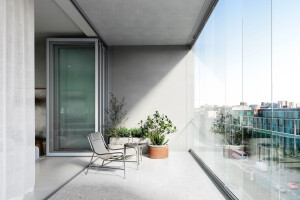For many years, high-rise blocks of flats had a bad image in Germany, It was impossible to imagine that they might one day be seen as exclusive living spaces. But rising population density and a lack of unused land have forced town planners to build high rather than wide. As inner cities have become more densely populated, the skyscraper trend has now finally reached German shores. Skyline Living in Stuttgart offers the perfect example of the benefits of large blocks of flats.
Rising above the skyline in the city’s northern “City Prag” district, the “Skyline” ensemble of high-rise buildings brings together work and life as convenient neighbours. Alongside the local cultural scene, the area also offers direct access to one of Stuttgart’s most attractive recreational areas. Part of the complex is a 75-metre-high apartment block called “Skyline Living”. With 22 floors, Skyline Living is one of Stuttgart’s highest residential areas. The restaurant on the ground floor is followed by six floors housing 72 fully furnished business apartments. The floors above these apartments house 72 flats. Two panorama penthouse flats on the 21st floor round off the building. The highlight of the flats is undoubtedly the top-class view.
Above the rooftops of Stuttgart
The tenants of the flats can even enjoy the view with an al fresco ambience, thanks to balconies that allow them to look out over all the city’s main landmarks. In order to ensure that the tenants on even the highest floors could make full use of their balconies, Bülow-AG, the company that owns the Skyline complex, decided to install all-glass weather protection that would also provide sound insulation. At the same time, however, they wanted the balconies to retain their open-air feel. This flexible solution was achieved using the frameless SL 25 slide-and-turn system from Solarlux. Mounted on the glass balustrade, the panes can be moved to the side one at a time and turned open to form a bundle that locks in place at a right angle and remains secure even in heavy winds.
When closed, the panes make the balcony a pleasant place to relax even in bad weather – and they even help make the building more sustainable. Although it is not thermally insulated, due to the depth of the balcony, the glazing acts as a heat barrier so that the living space doesn’t get too hot in summer – or too cold in winter. A total of 78 balconies were fitted with 702 glass elements.



























